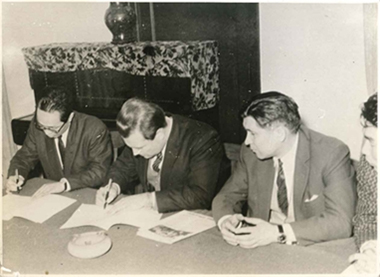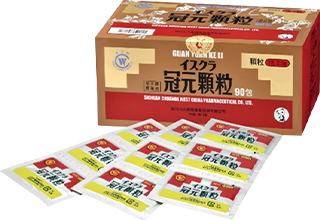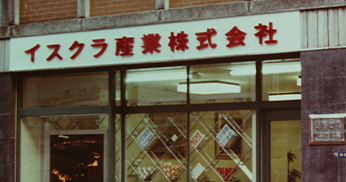Our Journey
Origin of Our Name
There is a Russian proverb that says, "Even a burning flame starts from a single spark". We named the company "Iskra", the Russian word for "spark", with the hope that the company will start out small but eventually grow large.
The origin of our name is also expressed in our symbol, which is a small red dot spreading out into a large circle.

Our First 30 Years
First in Japan to import the live polio vaccine
1960-1989
At the time of the company’s founding, Japan was in the grip of a nationwide outbreak of childhood paralysis, commonly known as polio. At that time, Shiro Ishikawa learned that the Soviet Union had a live vaccine to prevent polio and a medicine to treat the disease’s aftereffects. Trade with the Soviet Union, a socialist country, was unthinkable at the time. However, feeling a sense of mission to eradicate polio, Ishikawa worked tirelessly to get it done, succeeding in importing Japan’s first live vaccine and thereby helping eradicate polio.
“We’ll do ourselves what no one else will do.” This experience solidified what Iskra Industry stands for as a company.

MarchIskra Industry Co., Ltd. is founded
March Enters into a contract with the Soviet Pharmaceutical Product Import & Export Corporation for the importation of Galantamine, a medicine to treat the aftereffects of polio
JulySecures a contract to import 3 million doses of live polio vaccine; Nissho imports 7 million doses
AprilBegins importing the athlete’s foot medicine "Kada-kou", the first Chinese medicine imported by the company
MayIskra Pharmacy opens in Nihonbashi, Tokyo
NovemberConstruction of a new office building (the current headquarters) in Nihonbashi, Tokyo is completed
December1985 Iskra Chinese Herbal Medicine Center opens in Ichikawa City, Chiba Prefecture
JanuaryJapan Association for Study of Chinese Traditional Medicines is established
Our Second 30 Years
Expansion of our pharmaceutical business
1990-2019

MarchPharmaceutical product “Kangen Karyu” goes on sale
MarchIskra Chinese Herbal Medicine Product Center is relocated to Ichikawa City, Chiba Prefecture and expanded
OctoberIskra Chinese Herbal Medicine Center in Ichikawa City, Chiba Prefecture is relocated to a new facility
JuneSichuan Huaxing Pharmaceutical Co., Ltd. (Wenjiang Plant) is founded in Chengdu, China (operation begins the following year)
JulyStart of the Pet Business Division
Our Third 30 Years
Looking to the Future
2020-
Striving to Become a Vibrant Company with a 100-Year History
The Future of Iskra Industry
-
1. Sustainable Business Development
Expanding our trading and Chinese medicinal healthcare businesses, using them to develop new businesses
-
2. Human Resource Development
Investing in skill development on the organizational and individual levels to create a dynamic organization
Creating an organization that transcends nationality and gender and makes the most of one’s individuality and expertise -
3. Work Style Reforms
Adopting a healthy work-life balance and flexible work styles to create a workplace where employees can work with peace of mind for a long time
With these three pillars, we aim to become a dynamic,
100-year company that continues to grow.

